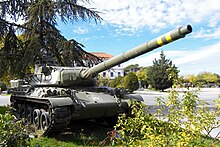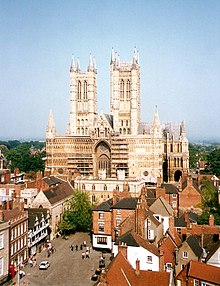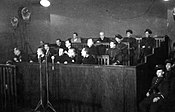Portal:History
The History Portal
History (derived from Ancient Greek ἱστορία (historía) 'inquiry; knowledge acquired by investigation') is the systematic study and documentation of the human past. History is an academic discipline which uses a narrative to describe, examine, question, and analyse past events, and investigate their patterns of cause and effect. Historians debate which narrative best explains an event, as well as the significance of different causes and effects. Historians debate the nature of history as an end in itself, and its usefulness in giving perspective on the problems of the present.
The period of events before the invention of writing systems is considered prehistory. "History" is an umbrella term comprising past events as well as the memory, discovery, collection, organization, presentation, and interpretation of these events. Historians seek knowledge of the past using historical sources such as written documents, oral accounts or traditional oral histories, art and material artefacts, and ecological markers.
Stories common to a particular culture, but not supported by external sources (such as the tales surrounding King Arthur), are usually classified as cultural heritage or legends. History differs from myth in that it is supported by verifiable evidence. However, ancient cultural influences have helped create variant interpretations of the nature of history, which have evolved over the centuries and continue to change today. The modern study of history is wide-ranging, and includes the study of specific regions and certain topical or thematic elements of historical investigation. History is taught as a part of primary and secondary education, and the academic study of history is a major discipline in universities.
Herodotus, a 5th-century BCE Greek historian, is often considered the "father of history", as one of the first historians in the Western tradition, though he has been criticized as the "father of lies". Along with his contemporary Thucydides, he helped form the foundations for the modern study of past events and societies. Their works continue to be read today, and the gap between the culture-focused Herodotus and the military-focused Thucydides remains a point of contention or approach in modern historical writing. In East Asia a state chronicle, the Spring and Autumn Annals, was reputed to date from as early as 722 BCE, though only 2nd-century BCE texts have survived. The title "father of history" has also been attributed, in their respective societies, to Sima Qian, Ibn Khaldun, and Kenneth Dike. (Full article...)
Featured picture
Did you know (auto generated)

- ... that the legal battle over awarding channel 9 in Orlando, Florida, the longest case in FCC history at the time, filled 55 volumes?
- ... that the 1971 Hazelwood massacre was the largest mass murder in the history of "Murder City"?
- ... that the Labour Party received their highest share of the vote to date in the 1951 UK general election but still lost to the Conservatives, who received fewer votes?
- ... that writer Malcolm Neesam was awarded the Freedom of the Borough of Harrogate, England, by the town council for services to local history?
- ... that the history of philosophy in India is characterized by its combined interest in the nature of reality, the ways of arriving at knowledge, and the spiritual question of how to reach enlightenment?
- ... that the 2022 Boca Raton Bowl was the first bowl game loss in Liberty program history after three wins in their first three appearances?
Alexander of Lincoln (died February 1148) was a medieval English Bishop of Lincoln, a member of an important administrative and ecclesiastical family. He was the nephew of Roger of Salisbury, a Bishop of Salisbury and Chancellor of England under King Henry I, and he was also related to Nigel, Bishop of Ely. Educated at Laon, Alexander served in his uncle's diocese as an archdeacon in the early 1120s. Unlike his relatives, he held no office in the government before his appointment as Bishop of Lincoln in 1123. Alexander became a frequent visitor to King Henry's court after his appointment to the episcopate, often witnessing royal documents, and he served as a royal justice in Lincolnshire.
Although Alexander was known for his ostentatious and luxurious lifestyle, he founded a number of religious houses in his diocese and was an active builder and literary patron. He also attended church councils and reorganised his diocese by increasing the number of archdeaconries and setting up prebends to support his cathedral clergy. Under Henry's successor, King Stephen, Alexander was caught up in the fall from favour of his family, and was imprisoned together with his uncle Roger in 1139. He subsequently briefly supported Stephen's rival, Matilda, but by the late 1140s Alexander was once again working with Stephen. He spent much of the late 1140s at the papal court in Rome, but died in England in early 1148. During his episcopate he began the rebuilding of his cathedral, which had been destroyed by fire. Alexander was the patron of medieval chroniclers Henry of Huntingdon and Geoffrey of Monmouth, and also served as an ecclesiastical patron of the medieval hermit Christina of Markyate and Gilbert of Sempringham, founder of the Gilbertines. (Full article...)
On this day
December 26: Saint Stephen's Day (Western Christianity); Boxing Day in the Commonwealth; Wren Day in Ireland and the Isle of Man; Kwanzaa begins (African diaspora in the Americas)
- 1862 – American Civil War: The Battle of Chickasaw Bayou began with Confederate defenders engaging Union forces who were attempting to capture the city of Vicksburg, Mississippi.
- 1871 – Thespis, the first comic opera by Gilbert and Sullivan, premiered at the Gaiety Theatre in London.
- 1900 – A relief crew arrived at the Flannan Isles Lighthouse (pictured) in Scotland and discovered that the previous crew had disappeared.
- 1943 – Second World War: The German battleship Scharnhorst was sunk at the Battle of the North Cape during an attempt to attack Arctic convoys.
- 2004 – A major earthquake and tsunami devastated communities around the Indian Ocean, killing an estimated 227,898 people in 14 countries.
- Willy Corsari (b. 1897)
- Elizabeth David (b. 1913)
- Milagros Benet de Mewton (d. 1948)
- Stanisław Kot (d. 1975)
Selected quote
Those who would give up Essential Liberty to purchase a little Temporary Safety, deserve neither Liberty nor Safety.
— Benjamin Franklin, American statesman
Related portals
More Did you know...
- ... that the anti-religious campaign culminating in the Stalinist show trial of the Kraków Curia (pictured) led to the imprisonment of 123 Polish Roman Catholic priests in just one year?
- ... that Confederate brigadier general Alfred E. Jackson was pardoned by President Andrew Johnson because of his kindness toward Johnson's family during the Civil War?
- ... that after HMS Porcupine was nearly split in two by a torpedo, the halves were nicknamed HMS Pork and HMS Pine?
- ... that the Experiment was a boat powered by horses running on a treadmill and propelled by a then-novel type of screw propeller?
- ... that one of the highest-ranking generals in China was injured in battle nine times?
- ... that in Mesopotamian mythology, the Apkallu were sent by the god Enki, from Dilmun to teach human beings various aspects of civilization?
- ... that Karl Marx's theory of historical trajectory attempted to prove the long-term unsustainability of capitalism?
- ... that in November 1921, the schooner Cymric collided with a tram in Dublin?
Topics
Categories

History • By period • By region • By topic • By ethnic group • Historiography • Archaeology • Books • Maps • Images • Magazines • Organizations • Fictional • Museums • Pseudohistory • Stubs • Timelines • Chronology • People • Wikipedia historians
WikiProjects
![]() WikiProject History •
Ancient Near East • Australian History • Classical Greece and Rome • Dacia • Former countries • History of Canada • Chinese history • European history • Heraldry and vexillology • Indian history • Jewish history • Medieval Scotland • Mesoamerica • Military history • Middle Ages • History of Science
WikiProject History •
Ancient Near East • Australian History • Classical Greece and Rome • Dacia • Former countries • History of Canada • Chinese history • European history • Heraldry and vexillology • Indian history • Jewish history • Medieval Scotland • Mesoamerica • Military history • Middle Ages • History of Science
WikiProject Time • Days of the Year • Years
WikiProject Biography • Composers • Political figures • Saints • United States Presidents
Things you can do
 |
Here are some tasks awaiting attention:
|
Associated Wikimedia
The following Wikimedia Foundation sister projects provide more on this subject:
-
Commons
Free media repository -
Wikibooks
Free textbooks and manuals -
Wikidata
Free knowledge base -
Wikinews
Free-content news -
Wikiquote
Collection of quotations -
Wikisource
Free-content library -
Wikiversity
Free learning tools -
Wiktionary
Dictionary and thesaurus

























































